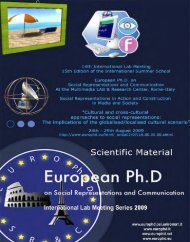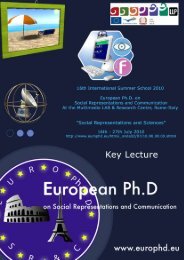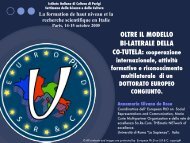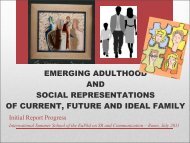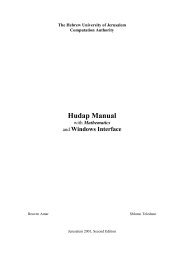The "boomerang" effect of the radicalism in discourse analysis
The "boomerang" effect of the radicalism in discourse analysis
The "boomerang" effect of the radicalism in discourse analysis
You also want an ePaper? Increase the reach of your titles
YUMPU automatically turns print PDFs into web optimized ePapers that Google loves.
gradually matured by Mor<strong>in</strong>, 1994) is a philosophical question <strong>of</strong> some importance.<br />
Even if Markova identifies <strong>the</strong> dialectic with <strong>the</strong> dialogue, it can be observed that <strong>the</strong><br />
latter (at least <strong>in</strong> <strong>the</strong> acceptation given by Mor<strong>in</strong>) is "opposable" to <strong>the</strong> "l<strong>in</strong>earity" <strong>of</strong> <strong>the</strong><br />
Hegelian conception <strong>of</strong> <strong>the</strong> dialectic based on <strong>the</strong> succession <strong>of</strong> <strong>the</strong>sis-anti<strong>the</strong>sissyn<strong>the</strong>sis.<br />
In fact if dialectic implies an exceed<strong>in</strong>g <strong>of</strong> <strong>the</strong> contradiction and a syn<strong>the</strong>sis <strong>of</strong><br />
<strong>the</strong> contraries <strong>in</strong> <strong>the</strong> context <strong>of</strong> a historical process def<strong>in</strong>able as "ant<strong>in</strong>omony <strong>in</strong><br />
movement" (D'Agost<strong>in</strong>i, 1999); <strong>the</strong> "dialogism" <strong>of</strong> Mor<strong>in</strong> (1994) expresses on <strong>the</strong><br />
contrary <strong>the</strong> idea <strong>of</strong> a confrontation and <strong>in</strong>terchange between concepts (or elements)<br />
"paradoxically" opposed and antagonist, not "dissoluble" one <strong>in</strong>to <strong>the</strong> o<strong>the</strong>r.<br />
“Hegel revealed to me a vision <strong>of</strong> <strong>the</strong> truth which met my needs (...), <strong>the</strong> truth was a totality; a totality<br />
that was always <strong>in</strong> movement (..). <strong>The</strong> dialectic represented <strong>the</strong> force <strong>of</strong> adher<strong>in</strong>g to this movement that<br />
characterised <strong>the</strong> totality, tackl<strong>in</strong>g and assum<strong>in</strong>g <strong>the</strong> contrary ideas, free<strong>in</strong>g <strong>the</strong>m from <strong>the</strong> dross and<br />
fertilis<strong>in</strong>g one with <strong>the</strong> o<strong>the</strong>r for giv<strong>in</strong>g birth to a "syn<strong>the</strong>sis", which should go beyond <strong>the</strong>m.”<br />
(Mor<strong>in</strong>, 1994, p. 57, my translation)<br />
“From 1948 to 1950 I ended up <strong>the</strong> prey to contradictions that my Hegelian "forma mentis" was no<br />
longer <strong>in</strong> a position to overcome (...). It was <strong>the</strong>n that <strong>the</strong> system broke up <strong>in</strong>to fragments. This rupture<br />
drove me towards <strong>the</strong> orig<strong>in</strong>al contradictions, <strong>in</strong>duc<strong>in</strong>g me to elaborate a conception that set itself anew to<br />
confrontation, without try<strong>in</strong>g to overcome it at any price.”<br />
(Mor<strong>in</strong>, 1994, p.59. my translation)<br />
“F<strong>in</strong>ally it is <strong>in</strong> <strong>the</strong> method that <strong>the</strong> dialogue clearly takes <strong>the</strong> place <strong>of</strong> <strong>the</strong> dialectic; <strong>in</strong> this work I<br />
elaborate and def<strong>in</strong>e <strong>the</strong> dialogism as association <strong>of</strong> examples at <strong>the</strong> same time complementary and<br />
antagonist”<br />
(Mor<strong>in</strong> 1994, p. 63, my translation)<br />
<strong>The</strong> relationship (or <strong>the</strong> differences) between dialogism and dialectic is a<br />
philosophically exact<strong>in</strong>g question which we shall not deal with here. What is important<br />
to highlight is that existence cannot be supposed <strong>of</strong> a dialogic relationship unless <strong>the</strong><br />
existence is supposed <strong>of</strong> <strong>the</strong> dimensions or entity establish<strong>in</strong>g <strong>the</strong> relationship itself (e.g.<br />
representation and communication, communication and social practices, cognition and<br />
action, etc.), however <strong>in</strong>extricably entw<strong>in</strong>ed and dynamically mutable it may be (and<br />
this applies also to <strong>the</strong> paradigmatic perspectives that Markova acknowledges to <strong>the</strong><br />
SRT).<br />
“<strong>The</strong> claim that social representations could be seen as be<strong>in</strong>g pragmatic presupposition <strong>of</strong><br />
communicative genres (Moscovici, 1994b) does not mean that one is talk<strong>in</strong>g here about layers with<br />
representations ly<strong>in</strong>g beneath and communication above. Ra<strong>the</strong>r, one must view <strong>the</strong>m as <strong>in</strong>terpenetrat<strong>in</strong>g<br />
and diffused: genres affect<strong>in</strong>g th<strong>in</strong>k<strong>in</strong>g and th<strong>in</strong>k<strong>in</strong>g shaped by language.”<br />
(Markova, 2000, p. 453)<br />
To write <strong>of</strong>f communication as a mere metaphor (Potter and Edwards, 1999, p. 449)<br />
implies that:<br />
(1) <strong>the</strong> RDA researches are based on a synecdoche: <strong>the</strong> part (<strong>the</strong> observable<br />
<strong>discourse</strong>, <strong>the</strong> message) replaces <strong>the</strong> whole (<strong>the</strong> communication with all its elements and<br />
processes);<br />
(2) this reductionism, or discursive immanentism, generates some "tautological<br />
monologues". <strong>The</strong> <strong>discourse</strong> reproposes with its totaliz<strong>in</strong>g dimension a new "essence" <strong>in</strong><br />
a proposal that is founded on "anti-essentialism".<br />
34




